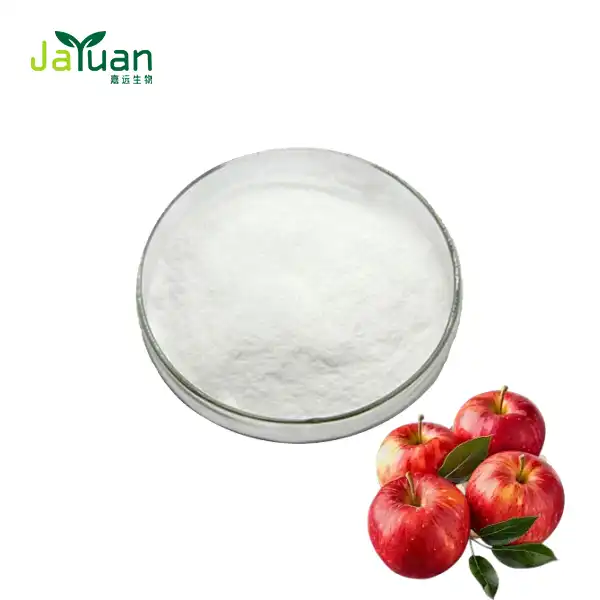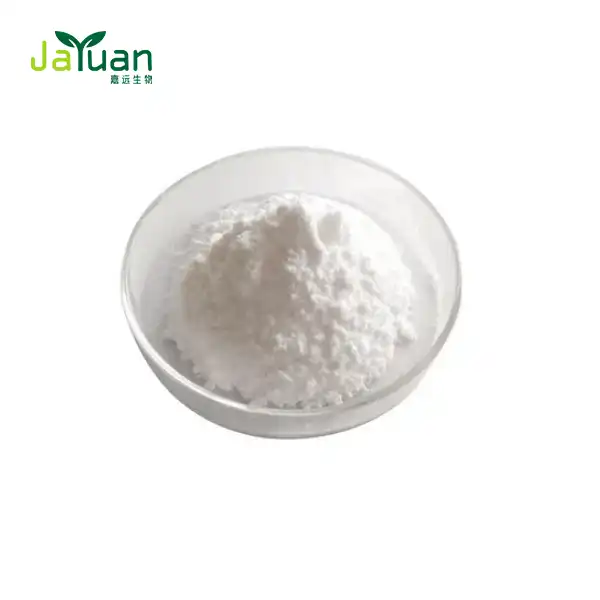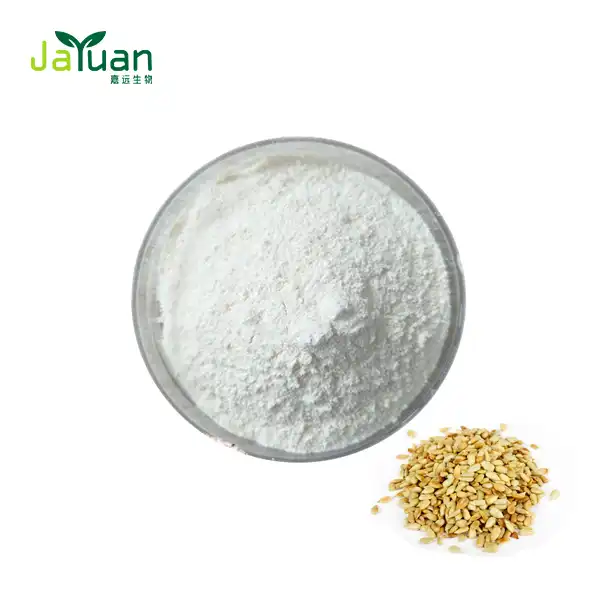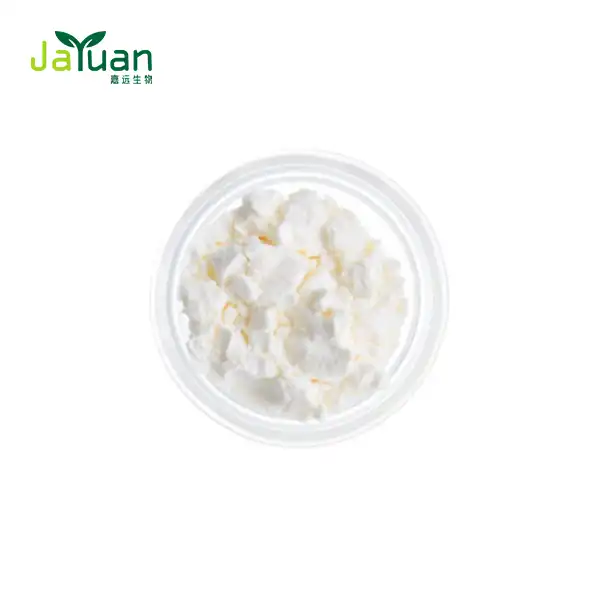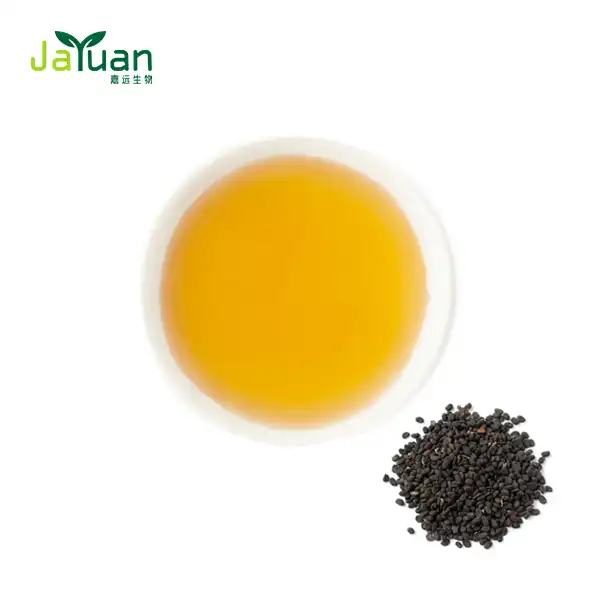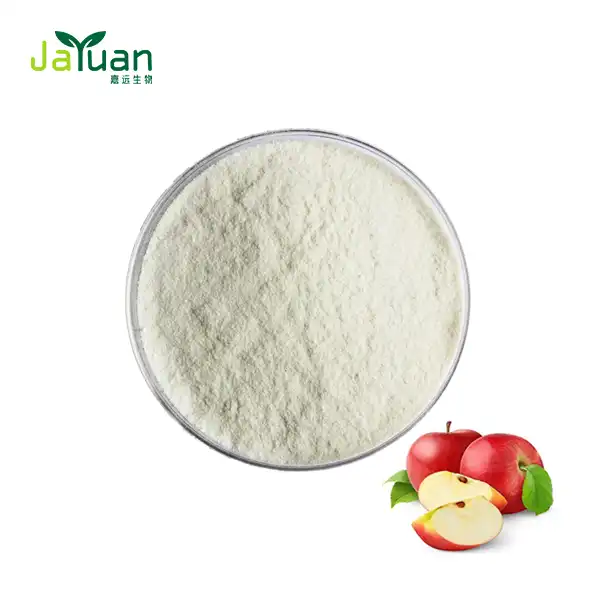What is the mechanism of alpha arbutin skin lightening?
Alpha arbutin has gained significant popularity in the skincare industry for its remarkable skin-lightening properties. This naturally derived compound offers a gentler alternative to harsh bleaching agents, making it a go-to choice for those seeking a more even skin tone. In this comprehensive guide, we'll delve into the intricate mechanism behind alpha arbutin powder and its effectiveness in reducing hyperpigmentation.

Step-by-Step: How Alpha Arbutin Reduces Melanin Synthesis
The skin-lightening effects of alpha arbutin are rooted in its ability to inhibit melanin production. Let's break down the process:
- Tyrosinase Inhibition: Alpha arbutin acts as a competitive inhibitor of tyrosinase, the key enzyme responsible for melanin synthesis. By binding to tyrosinase, it prevents the enzyme from catalyzing the conversion of tyrosine to melanin.
- Melanocyte Regulation: Beyond enzyme inhibition, alpha arbutin also influences melanocytes, the cells responsible for producing melanin. It helps regulate melanocyte activity, reducing overall melanin production.
- Melanosome Maturation Interference: Alpha arbutin slows down the maturation of melanosomes, the organelles within melanocytes where melanin is synthesized and stored. This further contributes to reduced pigmentation.
- Antioxidant Properties: As an antioxidant, alpha arbutin helps protect the skin from free radical damage, which can trigger excess melanin production.
- Gradual Lightening: Unlike harsh bleaching agents, alpha arbutin works gradually, allowing for a more natural and even lightening effect over time.
This multi-faceted approach makes alpha arbutin powder for skin a potent yet gentle skin-lightening agent. Its mechanism of action targets multiple stages of the melanin production process, resulting in a comprehensive lightening effect.
Clinical Evidence: Alpha Arbutin Powder for Hyperpigmentation
Numerous clinical studies have demonstrated the efficacy of alpha arbutin in addressing various forms of hyperpigmentation. Here's a summary of key findings:
- Melasma Improvement: A 12-week study involving participants with melasma showed significant improvement in skin lightness and reduction in hyperpigmented areas with the use of alpha arbutin.
- Age Spot Reduction: Research has indicated that alpha arbutin can effectively reduce the appearance of age spots, particularly when used in conjunction with other brightening agents.
- Post-Inflammatory Hyperpigmentation: Alpha arbutin has shown promise in minimizing post-inflammatory hyperpigmentation, often resulting from acne or other skin injuries.
- Overall Skin Tone Improvement: Studies have consistently reported an overall improvement in skin tone and luminosity with regular use of alpha arbutin-containing products.
- Safety Profile: Unlike hydroquinone, which can cause irritation and other side effects, alpha arbutin has demonstrated a favorable safety profile in clinical trials, making it suitable for long-term use.
These clinical findings underscore the potential of alpha arbutin powder as a safe and effective solution for various hyperpigmentation concerns. Its ability to address multiple types of pigmentation issues while maintaining a gentle approach to skin makes it a versatile option for many individuals seeking a more even complexion.
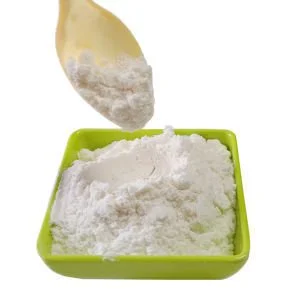
Combination Therapy: Alpha Arbutin with Vitamin C for Brighter Skin
While alpha arbutin is potent on its own, its efficacy can be enhanced when used in combination with other skin-brightening ingredients. One particularly synergistic pairing is alpha arbutin with vitamin C. Here's why this combination is so effective:
- Complementary Mechanisms: Alpha arbutin inhibits tyrosinase, while vitamin C interferes with melanin production at different stages. This dual-action approach provides a more comprehensive lightening effect.
- Enhanced Antioxidant Protection: Both alpha arbutin and vitamin C are powerful antioxidants. Together, they offer superior protection against free radical damage, which can trigger excess pigmentation.
- Improved Stability: Alpha arbutin can help stabilize vitamin C, which is notoriously unstable in skincare formulations. This means the benefits of both ingredients are preserved for longer.
- Collagen Boost: While alpha arbutin focuses on pigmentation, vitamin C stimulates collagen production. This combination not only brightens but also improves overall skin texture and firmness.
- Faster Results: Studies have shown that the combination of alpha arbutin and vitamin C can lead to more rapid and noticeable improvements in skin tone compared to using either ingredient alone.
When incorporating this powerful duo into your skincare routine, it's essential to use products that are specifically formulated to work together. Many advanced skincare formulations now include both alpha arbutin and vitamin C to capitalize on their synergistic effects.
It's worth noting that while alpha arbutin is generally well-tolerated, combining it with vitamin C may increase the potential for mild irritation in some individuals. As with any new skincare regimen, it's advisable to start slowly and monitor your skin's response.
Optimal Usage for Maximum Benefits
To get the most out of your alpha arbutin and vitamin C combination:
- Apply products containing these ingredients consistently, typically once or twice daily.
- Use sunscreen diligently, as both ingredients can increase skin sensitivity to UV radiation.
- Be patient - visible results usually take 4-8 weeks of regular use.
- Consider using a serum formulation for better penetration and efficacy.
By understanding the mechanism of alpha arbutin powder for skin lightening and leveraging its synergistic relationship with vitamin C, you can develop a powerful strategy for achieving brighter, more even-toned skin. Remember, consistency is key in any skincare routine, and results may vary depending on individual skin types and concerns.
The Future of Skin Lightening: Alpha Arbutin's Potential
As research in skincare science continues to advance, alpha arbutin stands out as a promising ingredient for the future of skin-lightening treatments. Its natural origin, coupled with its effectiveness and safety profile, positions it as a sustainable and ethical alternative to more controversial skin-lightening agents.
Ongoing studies are exploring new delivery systems for alpha arbutin, such as nanoencapsulation, which could potentially enhance its penetration and efficacy. Additionally, researchers are investigating the potential of alpha arbutin in addressing other skin concerns beyond hyperpigmentation, including its possible anti-aging effects.
The skincare industry is also seeing an increase in the development of multi-functional products that combine alpha arbutin with other cutting-edge ingredients. These formulations aim to provide comprehensive skin benefits, addressing not just pigmentation issues but also texture, hydration, and overall skin health.
Choosing the Right Alpha Arbutin Product
When selecting an alpha arbutin product, consider the following factors:
- Concentration: Look for products with a concentration of 1-2% alpha arbutin for optimal efficacy.
- Formulation: Serums and creams tend to be more effective than cleansers or toners.
- Additional Ingredients: Products that combine alpha arbutin with complementary ingredients like vitamin C, niacinamide, or kojic acid may offer enhanced benefits.
- pH Level: Alpha arbutin is most stable and effective in slightly acidic formulations (pH 4.0-5.5).
- Brand Reputation: Choose products from reputable brands that prioritize quality and transparency in their ingredient sourcing and manufacturing processes.
It's important to note that while alpha arbutin is generally safe for most skin types, individuals with sensitive skin or those prone to allergies should perform a patch test before incorporating any new product into their routine.
Conclusion
The mechanism of alpha arbutin powder for skin lightening offers a sophisticated approach to addressing hyperpigmentation and uneven skin tone. By inhibiting tyrosinase activity, regulating melanocyte function, and providing antioxidant protection, alpha arbutin presents a multi-faceted solution to one of the most common skincare concerns.
Its ability to work synergistically with other ingredients, particularly vitamin C, further enhances its potential as a cornerstone of effective skin-brightening routines. As research continues to uncover new applications and delivery methods for alpha arbutin, we can expect to see even more innovative and effective skincare solutions in the future.
Whether you're dealing with stubborn age spots, post-inflammatory hyperpigmentation, or simply seeking a more radiant complexion, alpha arbutin offers a promising path to achieving your skincare goals. By understanding its mechanism of action and leveraging its benefits through well-formulated products and consistent use, you can harness the power of this remarkable ingredient for brighter, more even-toned skin.
For those interested in exploring high-quality alpha arbutin products or learning more about its applications in skin care formulations, we invite you to reach out to our team at sales@jayuanbio.com, sales1@jayuanbio.com. Our experts are ready to provide personalized guidance and support in your journey towards healthier, more radiant skin.
References
1. Maeda, K., & Fukuda, M. (1996). Arbutin: mechanism of its depigmenting action in human melanocyte culture. Journal of Pharmacology and Experimental Therapeutics, 276(2), 765-769.
2. Sugimoto, K., Nishimura, T., Nomura, K., Sugimoto, K., & Kuriki, T. (2004). Inhibitory effects of α-arbutin on melanin synthesis in cultured human melanoma cells and a three-dimensional human skin model. Biological and Pharmaceutical Bulletin, 27(4), 510-514.
3. Boissy, R. E., Visscher, M., & DeLong, M. A. (2005). DeoxyArbutin: a novel reversible tyrosinase inhibitor with effective in vivo skin lightening potency. Experimental Dermatology, 14(8), 601-608.
4. Hu, Z. M., Zhou, Q., Lei, T. C., Ding, S. F., & Xu, S. Z. (2009). Effects of hydroquinone and its glucoside derivatives on melanogenesis and antioxidation: Biosafety as skin whitening agents. Journal of Dermatological Science, 55(3), 179-184.
5.Kolbe, L., Mann, T., Gerwat, W., Batzer, J., Ahlheit, S., Scherner, C., ... & Stäb, F. (2013). 4‐n‐butylresorcinol, a highly effective tyrosinase inhibitor for the topical treatment of hyperpigmentation. Journal of the European Academy of Dermatology and Venereology, 27, 19-23.
6. Sarkar, R., Arora, P., & Garg, K. V. (2013). Cosmeceuticals for hyperpigmentation: What is available?Journal of Cutaneous and Aesthetic Surgery, 6(1), 4.

